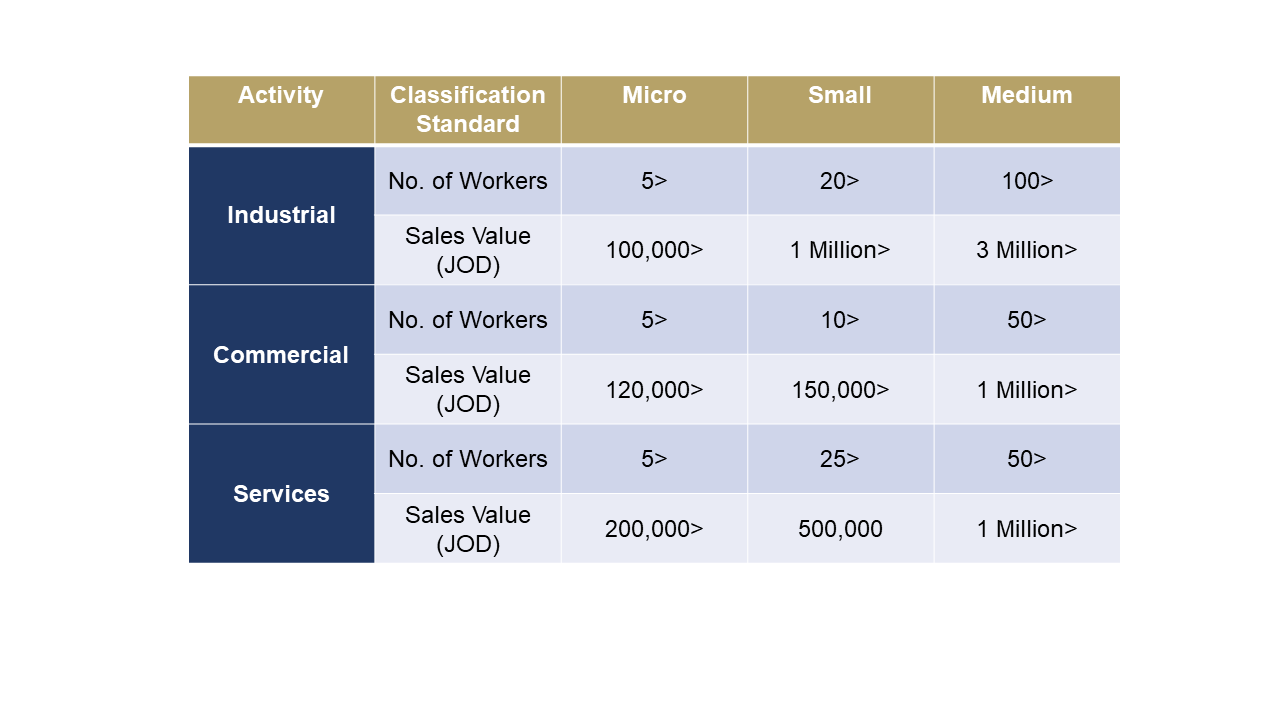The status quo of MSMEs in Jordan;
MSMEs are the basis and essence of economic and social development in the Kingdom, being essential platform for increasing the productive capacity of national economies besides their great ability to contribute to solving the problems of poverty and unemployment, promoting the principle of equitable income distribution, the development of local communities in the disadvantaged regions and many other miscellaneous contributions.
SMEs constitute approximately 99.5% of the total economic establishments operating in the Kingdom and occupy approximately 60% of the total workforce. Perhaps the most important characteristic of SMEs as a source of job opportunities is their contribution to providing more than half of the opportunities created annually in the Jordanian economy according to what was mentioned in the created job opportunities surveys published by the Department of Statistics.
The relative distribution of the numbers of economic establishments according to size
Despite these distinguished contributions of SMEs in terms of providing employment opportunities, their contribution to the gross domestic product does not exceed 30% of the gross domestic product, and their share of national exports does not exceed 10% of the total exports according to World Trade Center studies.
Its weak contributions to production and export come as a result of many obstacles that affect its production and consequently its growth and business continuity which is reflected in its economic and social contribution. The most prominent of these obstacles hinge on the weakness of the surrounding work environment, the difficulty of accessing markets, the weak entrepreneurship culture in society and the difficulty of accessing various resources of electricity, energy, financing, etc.
The most prominent challenges facing SMEs in Jordan
1. Infrastructure.
2. Institutionalization.
3. Creativity and entrepreneurship.
4. Evolving market requirements.
5. Human capital.
6. Access to funding sources.
Standard classification for MSMEs in Jordan

SMEs technical support unit
As it is the belief of Jordan Chamber of Industry of the capabilities of SMEs to be real engines of growth and the need to enhance their role in other important aspects such as their contribution to the gross domestic product and national exports, JCI has committed itself to think about a system of work for such facilities in the industrial sector and in a way that helps them to face the small challenges that confront them.
From this standpoint, in addition to the weak representation of craft establishments in the General Authority of Industrial Chambers, and consequently the weak services provided to this important category of companies, the Chamber has sought to establish a technical support unit for small and medium enterprises since 2011 and to build its business plan, based on;
- Limiting international experiences in supporting these facilities.
- Conducting an industrial needs survey.
- Defining the main needs from the point of view of these establishments.
- Explore the needs of these establishments from the partners' point of view.
To form one of the vital pillars of the Member Services Department and to work according to an integrated system to serve these establishments in the industrial sector in a way that helps them face the challenges they confront. The efforts were focused on four main services provided by the unit, which constitute the core of the challenges facing SMEs, and were centered in each of; Access to financing sources, access to markets, increased administrative and technical capabilities, and consulting.
- Access to funding sources.
- Access to markets.
- Raising administrative and technical capabilities.
- Consulting.
It should be noted that the Chamber of Industry Law No. 10 of 2005 sets the responsibility for representing craft institutions in the chambers of industry to one member, who is elected by the members of the Chamber's Board of Directors. The craft organization is defined according to the law as an institution operating in the industrial sector whose registered capital is less than thirty thousand dinars, and the number of employees in it is less than ten Jordanian workers registered in social security.






